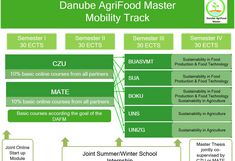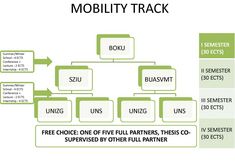Curriculum
The current study plan can be downloaded on the webpage of the Study services.
Academic content
Sustainable development, food security, technology and quality, sustainable food production, biotechnology and sustainable energy are the core content of the master program. With the international Joint Master program thus a unique and competent response to issues such as climate change and protection and promotion of livelihoods is offered in and for the Danube region.
Graduates Learning Objectives
- to have a deep knowledge of agriculture and food production under the aspect of sustainability in the Danube Region;
- to be able to network and exchange the most actual knowledge of agricultural, food production and food technology under the aspect of sustainability
- to understand the development of Danube Region from point of view of ecology, rural development and cultural history
- to have the capability to critically select and apply adequate methods for sustainability in agriculture, food production and food technology
- to be able to analyse social interactions in an intercultural context. Due to the intercultural competence achieved, the graduate is able
- to be solely responsible for guiding international project teams to have interdisciplinary knowledge, competencies and skills in agricultural and/or food science with a major focus on sustainability and sustainable technologies
- to have qualification in intercultural learning, which allows a deeper understanding of the cultural and social development of and in the Danube region
Check DAFM Alumni statements on the programme website here.
DAFM 2022 - 2027
Programme Structure
The master’s programme consists of courses and other requirements worth a total of 120 ECTS credits.
Structure of the master´s programme:
Compulsory courses: 55 ECTS credits
Elective courses: 29 ECTS credits
Free electives: 6 ECTS credits
Master’s thesis: 30 ECTS credits
The curriculum consists of 4 Focus Areas with compulsory and elective courses:
FA1: Food safety and consumer science
FA2: Sustainable agriculture
FA3: Soil, water and climate
FA4: Intercultural learning
Mobility Track
Each student has to study at two different universities according to the chosen specialization and mobility track. A minimum of 30 ECTS credits has to be completed per semester. The 4th semester is dedicated to completing the master’s thesis.
Students have to complete the following schedule:
Specialization 1: Sustainability in Food Production and Food Technology
Semester 1 and 2 at MATE or CZU
Semester 3 and 4 at ULST (former BUASVMT), SUA or BOKU
Specialization 2: Sustainability in Agriculture
Semester 1 and 2 at MATE or CZU
Semester 3 and 4 at UNIZG, UNS or BOKU
Both specializations include
Joint online start up module before semester 1
Compulsory summer or winter school before semesters 2, 3 or 4
Compulsory internship before semesters 2, 3 or 4
DAFM 2016 - 2020
Mobility track
Each student has to study at at least 3 different universities. For mobilites to partner universities there are different scholarship programmes available (Erasmus+ or CEEPUS), see scholarship opportunities for DAFM students.
In detail, this means that the students have to complete the following schedule:
- Summer or Winter School
- Semester 1 at BOKU (Austria)
- Semester 2 at MATE (former "SZIU", Hungary) or ULST (former "BUASVMT", Romania)
- Summer or Winter School
- Semester 3 at UNIZG (Croatia) or UNS (Serbia)
- Semester 4: master’s thesis and graduation at one of the 5 degree-awarding partner universities (BOKU, MATE, ULST, UNIZG, UNS): with co-supervision of master’s thesis by another of the 5 degree-awarding partner universities
The Summer/Winter Schools will take place either before semesters 1 and 3 or before semesters 2 and 4, hosted by associate partners SGGW(Poland) CZU (Czech Republic) or SUA Nitra (Slovakia).
The compulsory, study-related internship and ideally a participation at a scientific conference such as the annual CASEE Conference (complementary to the course "Presenting at a scientific conference") have to be done during the 4 semesters.
Each degree-awarding partner offers courses of at least 30 ECTS credits per semester for students to choose.


